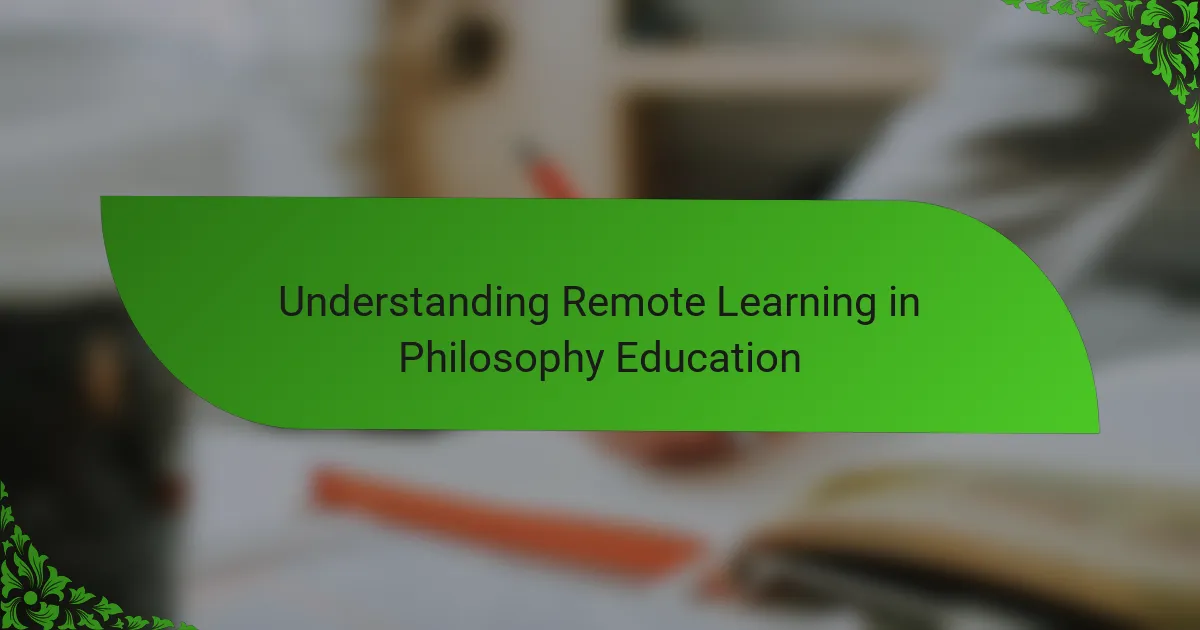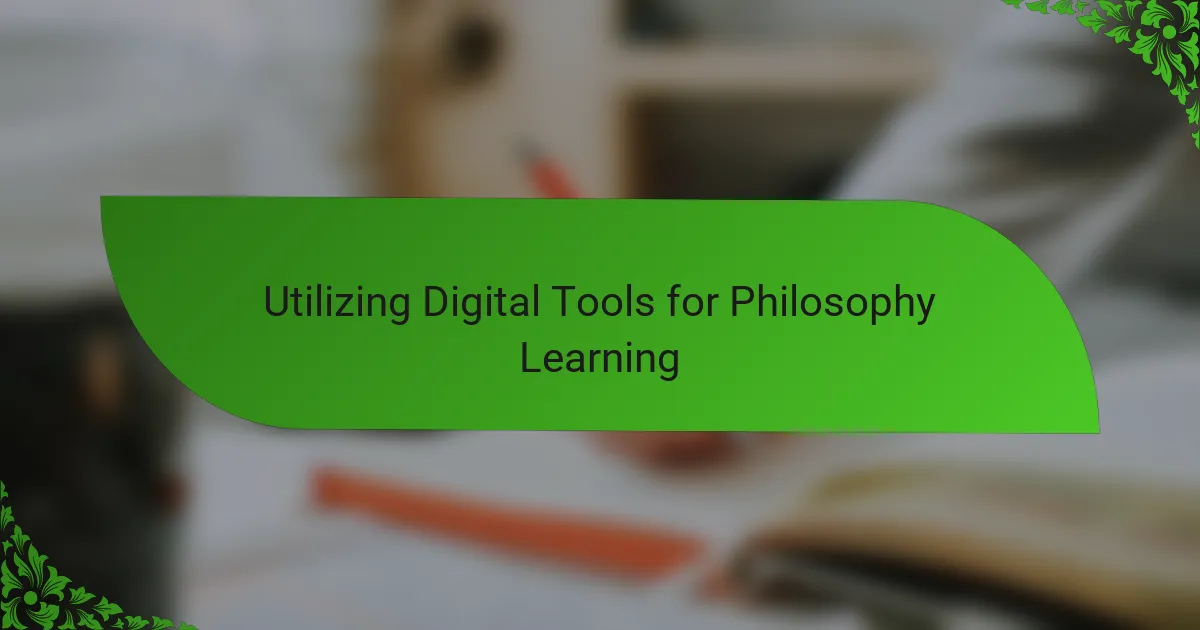Key takeaways
- Remote learning shifted the engagement in philosophy classes, requiring deeper reflection through written communication and online discussions.
- Setting a structured study routine and using digital tools enhanced the learning process and helped maintain motivation in a remote environment.
- Effective communication in online settings involved proactive outreach and patience, allowing for richer discussions despite the lack of immediate feedback.
- Creating personal rituals and taking time for reflection improved focus and insight during remote philosophy studies.

Understanding Remote Learning in Philosophy Education
Philosophy is inherently a dialogue-driven discipline, and shifting that rich, face-to-face exchange to a remote environment immediately felt like losing something vital. I remember wondering, how could virtual classrooms capture the spontaneity and depth of in-person debates that philosophy thrives on? That initial skepticism echoed in my experience, as I missed the subtle cues and lively interactions that often spark profound insights.
Adapting to remote learning meant rethinking how I engage with philosophical texts and peers. Without the usual classroom energy, I found myself relying more on written reflections and online discussion boards, which forced me to articulate my thoughts more precisely. While this was challenging, it also deepened my understanding, as I had to slow down and really consider different perspectives before responding.
Is it possible that remote learning, despite its hurdles, offers unique opportunities for philosophy education? I discovered that having recorded lectures and flexible study times allowed me to revisit complex ideas at my own pace. This shift in how I engage with material challenged my assumptions and ultimately enriched my learning experience, even if it initially felt like navigating an unfamiliar landscape.

Common Challenges in Philosophy Distance Learning
One of the toughest challenges I faced was the lack of immediate feedback during discussions. In philosophy, those quick exchanges—where someone challenges your idea or offers a fresh angle—fuel deeper understanding. Without that back-and-forth, I often felt like I was thinking in isolation, which made it harder to refine my arguments.
Another struggle was interpreting tone and meaning through text alone. Written posts sometimes came across more blunt or unclear than spoken words would, causing misunderstandings or hesitation to participate. I found myself wondering: Am I reading too much into this? Is my response on point? That uncertainty added a layer of anxiety I hadn’t anticipated.
Even managing motivation became tricky. Philosophy requires sustained focus on abstract concepts, and without the physical classroom setting, distractions were everywhere. At times, I caught myself drifting off during video lectures, which made me question how to stay fully engaged when the structure feels so different from what I’m used to.

Effective Study Strategies for Remote Philosophy Courses
One strategy that transformed my remote philosophy studies was setting a dedicated study schedule. I asked myself, how can I recreate the rhythm of in-person classes? By carving out specific times for reading, writing, and reflection, I created a sense of routine that kept me accountable and prevented the distraction spiral that often hits when learning from home.
I also found that active note-taking during lectures made a huge difference. Instead of passively listening, I jotted down questions and counterarguments as they occurred to me. This practice didn’t just keep me engaged; it echoed the dialectical nature of philosophy and helped me stay mentally present despite the screen barrier.
Finally, I learned to embrace online forums and virtual study groups as spaces for dialogue. Initially, typing out my thoughts felt slow and awkward—nothing like the quick-fire debates I missed. But over time, these written exchanges pushed me to clarify my positions and consider new angles. Has anyone else noticed how crafting a thoughtful post can sometimes lead to deeper insights than a verbal reply? For me, that was a surprising silver lining of remote learning.

Utilizing Digital Tools for Philosophy Learning
Digital tools quickly became my lifeline for philosophy learning during remote studies. Platforms like Zoom allowed for live discussions, which, while different from in-person debates, still captured some of that critical back-and-forth energy I missed. I often found myself leaning into these virtual dialogues, wondering how technology could replicate the spontaneity of face-to-face exchanges.
I also discovered the power of digital note-taking apps. Instead of scribbling on paper, I used tools like OneNote to organize ideas and cross-reference philosophical texts. This shift made my study sessions more interactive and flexible, letting me link concepts dynamically—a practice that deepened my engagement with complex arguments in a way I hadn’t expected.
Have you ever tried recording your own philosophical reflections? I started using voice memos to capture sudden insights or questions during readings. Listening back later helped me clarify my thoughts and track my evolving understanding without the pressure of immediate response. In the isolation of remote learning, these digital tools became more than convenience—they became essential companions in my philosophical journey.

Managing Time and Motivation Remotely
Managing my time remotely felt like navigating uncharted waters at first. Without the natural structure of class schedules, I quickly realized that discipline had to come from within. I began blocking out specific hours for philosophy study, treating them like untouchable appointments, which surprisingly boosted my productivity and reduced the temptation to procrastinate.
Staying motivated was an entirely different challenge. There were days when the quiet of my room made philosophical texts feel heavier, and I questioned whether I could sustain the same level of intellectual curiosity alone. What helped me was setting small, achievable goals—reading a single passage thoroughly or writing a brief reflection—which gradually built momentum and kept my engagement alive.
I also found that mixing up my routine was essential. Sometimes I’d switch from solo reading to joining an online discussion or listening to a recorded lecture, just to break the monotony. This variety rekindled my motivation because it reminded me that remote learning doesn’t have to be isolating—it’s about creating new rhythms that work for me.

Overcoming Communication Barriers in Online Philosophy Classes
Navigating communication in online philosophy classes felt like learning a new language at first. I often missed the spontaneous sparks that arise from face-to-face debates—the quick interjections, the raised eyebrows, or even a thoughtful pause. Without these cues, I found myself asking, how can I express nuance or challenge ideas effectively when all I have is a text box or muted microphone?
One habit that helped me bridge this gap was embracing frequent check-ins with classmates and the professor, even if it felt a bit awkward at first. Sending a quick message to clarify a point or asking for elaboration felt like little sparks reigniting the conversation. Over time, these small efforts created a sense of connection that made the virtual space feel less like a barrier and more like a shared thinking ground.
I also learned to be patient with silence and unexpected pauses in discussions. In the absence of immediate feedback, I found that giving others extra time to formulate their thoughts often led to richer, more considered responses. Isn’t it ironic how slowing down the pace actually deepened the dialogue? That realization changed how I approached every online class, turning frustration into a more reflective and meaningful exchange.

Personal Tips for Success in Philosophy Remote Learning
What really helped me succeed was creating a personal ritual before each remote philosophy session. I’d clear my desk, brew a cup of tea, and take a few deep breaths—almost like preparing for a mini meditation. This small act shifted my mindset from “just another Zoom call” to a focused space for deep thinking. Have you ever noticed how setting a simple tone can change your whole approach to studying? For me, it made all the difference.
I also found that staying proactive about reaching out was key. Instead of waiting for others to initiate discussions, I started sending thoughtful questions or reflections in the chat. Sometimes it felt vulnerable, like putting my ideas out there without the safety net of immediate feedback. But over time, those messages sparked conversations that felt almost as rich as in-person debates. Isn’t it interesting how taking that first step can open doors we didn’t expect?
Finally, carving out “philosophical pauses” during my day became essential. Philosophy often demands more than quick answers; it needs reflection. So, I’d set moments away from screens to mentally mull over complex arguments or paradoxes. It was during those quiet, sometimes frustrating pauses that I noticed new insights emerging. Have you ever experienced that sudden clarity after stepping back? For me, embracing those pauses was a personal tipping point in mastering remote learning.